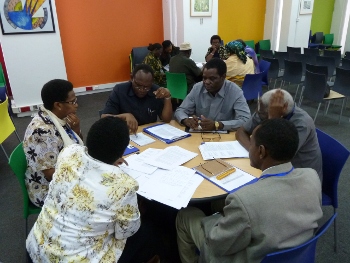Culture Diversity Lens: A workshop on culturally appropriate programming in Tanzania
How does Culture matter in Development? And how can we be more sensitive to Culture, while we plan and implement development projects? These were the questions at the core of a workshop organized by UNESCO Dar es Salaam jointly with the Ministry of Information, Youth, Culture and Sports. The workshop, held at the British Council in September 2011, gathered 30 participants from Ministries and government institutions dealing, in their daily work, with Culture and Heritage. The participants, for two days, deliberated on the important role culture plays in the development of Tanzania, and learned how to use the Cultural Diversity Lens (CDL), a tool created by UNESCO to mainstream cultural concerns into projects and policies.
 The workshop, officially inaugurated by the Deputy Permanent Secretary, Ministry of Information, Youth, Culture & Sports, Mrs. Sihaba Nkinga, represented a first step towards greater awareness for culturally appropriate programming and introduced the participants to a potential new role they may in the future have to play, which is to brief and assist other government departments on the relevance and techniques of culturally appropriate programming.
The workshop, officially inaugurated by the Deputy Permanent Secretary, Ministry of Information, Youth, Culture & Sports, Mrs. Sihaba Nkinga, represented a first step towards greater awareness for culturally appropriate programming and introduced the participants to a potential new role they may in the future have to play, which is to brief and assist other government departments on the relevance and techniques of culturally appropriate programming.
The workshop clearly responded to a need as participants expressed their intention of passing on their newly gained knowledge to their teams, and of using the Cultural Diversity Lens in their policy and programming work. They expressed the urgent need for further initiatives to sensitize Government, donors and civil society to better understand the important role culture plays in fostering development in Tanzania. Participants also invited UNESCO to take further initiatives to assure that the projects and funding schemes in Tanzania would be culturally sensitive and that the Government of Tanzania would request of its partners that they apply a culturally appropriate approach. For more, read the report on this link


